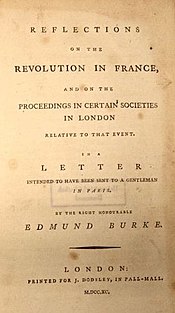
Back Portail:Conservatisme French Portal:Konservatisme NB Portal:Conservadorismo Portuguese Portal:Konservatism Swedish
| Main page | Showcase | Project |
Introduction
Conservatism is a cultural, social, and political philosophy and ideology, which seeks to promote and preserve traditional institutions, customs, and values. The central tenets of conservatism may vary in relation to the culture and civilization in which it appears. In Western culture, depending on the particular nation, conservatives seek to promote and preserve a range of institutions, such as the nuclear family, organised religion, the military, the nation-state, property rights, rule of law, aristocracy, and monarchy. Conservatives tend to favour institutions and practices that enhance social order and historical continuity.
Edmund Burke, an 18th-century Anglo-Irish statesman who opposed the French Revolution but supported the American Revolution, is credited as one of the forefathers of conservative thought in the 1790s along with Savoyard statesman Joseph de Maistre. The first established use of the term in a political context originated in 1818 with François-René de Chateaubriand during the period of Bourbon Restoration that sought to roll back the policies of the French Revolution and establish social order.
Conservatism has varied considerably as it has adapted itself to existing traditions and national cultures. Thus, conservatives from different parts of the world, each upholding their respective traditions, may disagree on a wide range of issues. Historically associated with right-wing politics, the term has been used to describe a wide range of views. Conservatism may be either libertarian or authoritarian, populist or elitist, progressive or reactionary, moderate or extreme. (Full article...)
Selected article
Selected quote
Therefore I trace the peculiar unity of the everyday political philosophy of the nineteenth century to the success with which it harmonised diversified and warring schools and united all good things to a single end. Hume and Paley, Burke and Rousseau, Godwin and Malthus, Cobbett and Huskisson, Bentham and Coleridge, Darwin and the Bishop of Oxford, were all, it was discovered, preaching practically the same thing - individualism and laissez-faire. This was the Church of England and those her apostles, whilst the company of the economists were there to prove that the least deviation into impiety involved financial ruin.
These reasons and this atmosphere are the explanations, we know it or not - and most of us in these degenerate days are largely ignorant in the matter - why we feel such a strong bias in favour of laissez-faire, and why state action to regulate the value of money, or the course of investment, or the population, provokes such passionate suspicions in many upright breasts. We have not read these authors; we should consider their arguments preposterous if they were to fall into our hands. Nevertheless we should not, I fancy, think as we do, if Hobbes, Locke, Hume, Rousseau, Paley, Adam Smith, Bentham, and Miss Martineau had not thought and written as they did. A study of the history of opinion is a necessary preliminary to the emancipation of the mind. I do not know which makes a man more conservative - to know nothing but the present, or nothing but the past.
— John Maynard Keynes, The End of Laissez-Faire (1926)
Selected image
Reflections on the Revolution in France (1790), by Edmund Burke, is one of the best-known intellectual attacks against the (then-infant) French Revolution. In the twentieth century, it much influenced conservative and classical liberal intellectuals, who recast Burke's Whig arguments as a critique of Communism and Socialist revolutionary programmes.
Edmund Burke served in the British House of Commons, representing the Whig party, in close alliance with liberal politician Lord Rockingham. In Burke's political career, he vigorously defended constitutional limitation of the Crown's authority, denounced the religious persecution of Catholics in his native Ireland, voiced the grievances of Britain's American colonies, supported the American Revolution, and vigorously pursued impeachment of Warren Hastings, the governor-general of Bengal, for corruption and abuse of power.
In 1789, soon after the fall of the Bastille, the French aristocrat Charles-Jean-François Depont asked his impressions of the Revolution; Burke replied with two letters. The longer, second letter became Reflections on the Revolution in France, published in 1790.
Credit: Awadewit
Did you know...
- ...that Ronald Reagan is the only president of the United States to have his diaries published into a best selling book?
- ...that in Edward Heath's 1968 Declaration of Perth, he pledged the Conservative Party's support for Scottish devolution, a policy later reversed by Margaret Thatcher?
- ... that Norwegian botanist and politician Olaf Alfred Hoffstad taught at Sandefjord Upper Secondary School for almost 43 years?
Selected anniversaries in June
- 1979 – in the United States, the Moral Majority is founded by Jerry Falwell and Paul Weyrich.
- 1983 – the United Kingdom general election was held on 9 June. It gave the Conservative Party under Margaret Thatcher the most decisive election victory since that of Labour in 1945.
- 1987 – in a reference to the Berlin Wall, US President Ronald Reagan challenges Soviet leader Mikhail Gorbachev to "Tear down this wall!"
Topics
Associated Wikimedia
The following Wikimedia Foundation sister projects provide more on this subject:
-
Commons
Free media repository -
Wikibooks
Free textbooks and manuals -
Wikidata
Free knowledge base -
Wikinews
Free-content news -
Wikiquote
Collection of quotations -
Wikisource
Free-content library -
Wikiversity
Free learning tools -
Wiktionary
Dictionary and thesaurus
© MMXXIII Rich X Search. We shall prevail. All rights reserved. Rich X Search









